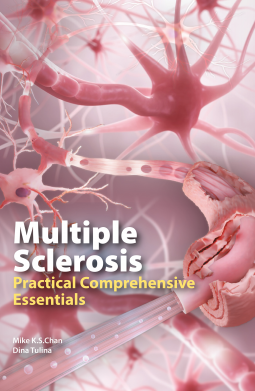
Multiple Sclerosis
Practical Comprehensive Essentials
by Mike K.S. Chan; Dina Tulina
This title was previously available on NetGalley and is now archived.
Send NetGalley books directly to your Kindle or Kindle app
1
To read on a Kindle or Kindle app, please add kindle@netgalley.com as an approved email address to receive files in your Amazon account. Click here for step-by-step instructions.
2
Also find your Kindle email address within your Amazon account, and enter it here.
Pub Date 28 Jun 2022 | Archive Date 26 Jul 2022
Talking about this book? Use #MultipleSclerosis #NetGalley. More hashtag tips!
Description
Multiple sclerosis (MS) is a progressive neurological disease that affects millions of people worldwide. Currently, the causes of MS are still unclear and the cure remains symptomatic, while the effectiveness of treatment varies widely among individuals. The clinical features and neurological defects derived from this progressive neurological disease are diverse since MS may affect the human central nervous system (CNS)) at all levels from the brain to the end of the spinal cord. Immunopathogenesis of MS involves many steps, including activation of peripheral leucocytes against putative CNS antigens, activated leucocytes with inflamed cerebral endothelial cells, the migration of activated lymphocytes and macrophages through the endothelium to the CNS environment, and further propagation of a massive immune response within the CNS. Such large-scale immune activation leads to loss of the myelin-oligodendrocyte complex. Various types of immune cells and mediators of the immune-inflammatory response actively contribute to MS pathogenesis. Genetic factors are also thought to play a central role in the development of most forms of MS. Axonal degeneration and neuronal loss are the core components of irreversible and permanent CNS atrophy and disability in MS.
This book provides a comprehensive overview of the current MS situation as researchers try to understand the process and develop treatments that can slow or stop the disease, possibly repair the damage, alleviate specified symptoms, and improve the abilities of MS patients to function in everyday life. Various biological holistic approaches have been shown to slow disease progression in some patients, and the recovery rate of cellular mechanisms in the brain and spinal cord has been accelerated, increasing the possibility of achieving complete balance of the disease state.
The panel reviews the background, focusing on novel strategies that are most likely to understand the biological mechanisms of recovery and translate findings into alternative comprehensive approach to the MS management. The modality of such complementary therapies adds a new dimension, geared to further improvement in the management and sustain the acquired long-term results of MS. This book will be necessary to researchers, research funders, healthcare advocates of MS research and treatment, and interested patients and their families.
A Note From the Publisher
Available Editions
| EDITION | Ebook |
| ISBN | 9781803133454 |
| PRICE | £37.50 (GBP) |
| PAGES | 152 |
Featured Reviews
 Reviewer 823951
Reviewer 823951
An interesting and informative read. Multiple sclerosis (MS) is a progressive neurological disease that affects millions of people worldwide. Currently, the causes of MS are still unclear and the cure remains symptomatic, while the effectiveness of treatment varies widely among individuals. The clinical features and neurological defects derived from this progressive neurological disease are diverse since MS may affect the human central nervous system (CNS)) at all levels from the brain to the end of the spinal cord. Immunopathogenesis of MS involves many steps, including activation of peripheral leucocytes against putative CNS antigens, activated leucocytes with inflamed cerebral endothelial cells, the migration of activated lymphocytes and macrophages through the endothelium to the CNS environment, and further propagation of a massive immune response within the CNS. Such large-scale immune activation leads to loss of the myelin-oligodendrocyte complex. Various types of immune cells and mediators of the immune-inflammatory response actively contribute to MS pathogenesis. Genetic factors are also thought to play a central role in the development of most forms of MS. Axonal degeneration and neuronal loss are the core components of irreversible and permanent CNS atrophy and disability in MS.
Multiple Sclerosis is a disease that impacts every single aspect of your life. As your immune system is actively attacking the brain and spinal cord different symptoms present and each emerging symptom will likely worsen previously impacted abilities leading to a snowball effect. I am a neurology nurse practitioner and I care for patients with MS routinely - this disease is very hard on patients including their families and friends. The symptoms of MS are symptoms that can be associated with numerous neurological, autoimmune, and psychological conditions. MS is usually thought of when everything else has been ruled out - this can lead to delayed diagnosis and it allows the disease to “run free” for quite a while - sometimes years - leading to permanent damage of the nervous system.
Quite simply once MS is confirmed as the diagnosis the aim is 1) Shut the disease down as quickly and effectively as possible, and 2) Maintain the patient’s ability to perform activities of daily living as independent as possible for as long as possible. Things such as cooking, bathing, housekeeping, and being gainfully employed - living a normal life as long as possible - are one of the challenges patients with MS deal with. Each flare of active MS usually decreases the patient’s independence bit by bit and abilities are diminished to never be regained.
Any educational text that can help clinicians identify and treat MS as quickly as possible is a good thing. This book has that ability. The writing is clear and succinct. The book is well organized which makes it an easy to use clinical reference.
I recommend this book for clinicians and patients.


















